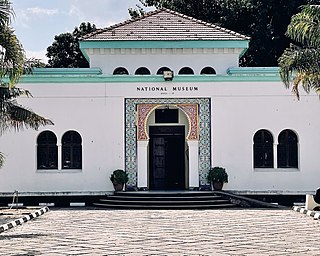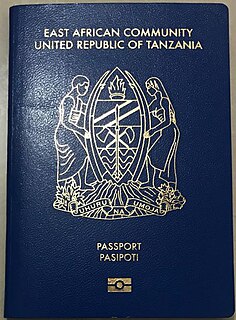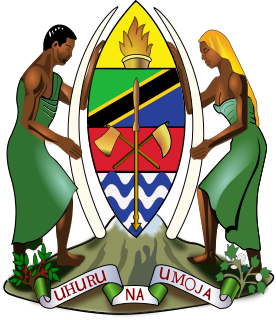Related Research Articles

Tanzania, officially the United Republic of Tanzania, is a country in East Africa within the African Great Lakes region. It borders Uganda to the north; Kenya to the northeast; Comoro Islands and the Indian Ocean to the east; Mozambique and Malawi to the south; Zambia to the southwest; and Rwanda, Burundi, and the Democratic Republic of the Congo to the west. Mount Kilimanjaro, Africa's highest mountain, is in northeastern Tanzania.

Tanzania's first president, Julius Nyerere also was one of the founding members of the Non-Aligned Movement, and, during the Cold War era, Tanzania played an important role in regional and international organisations, such as the Non-Aligned Movement, the front-line states, the G-77, and the Organisation of African Unity (OAU). One of Africa's best-known elder statesmen, Nyerere was personally active in many of these organisations, and served chairman of the OAU (1984–85) and chairman of six front-line states concerned with eliminating apartheid in Southern Africa. Nyerere was also involved with peace negotiations in Burundi until his death. Nyerere's death, on 14 October 1999, is still commemorated annually.

Kivukoni is an administrative ward located in Ilala District, Dar es Salaam Region of Tanzania. Kivikoni's name come from the Swahili word meaning "a crossing place". The ward is bordered by Upanga East ward to the west, Kisutu ward to the southwest, and Kigamboni ward across the Kivukoni channel. The ward covers an area of 2.387 km2 (0.922 sq mi). Kivukoni ward is one of the most important wards in the country, as it is home to the Ikulu, which is the home of the president of Tanzania. Kivukoni ward is also home to the National Museum of Tanzania. According to the 2012 census, the ward had a total population of 6,742.

A border guard of a country is a national security agency that performs border security. Some of the national border guard agencies also perform coast guard and rescue service duties.
The Danish Immigration Service is a directorate within the Danish Ministry of Refugees, Immigration and Integration Affairs. The service administrates the Danish Aliens Act, in other words, it handles applications for asylum, family reunification, visas, work permits, etc. In addition, the service is engaged in a wide range of other duties relating to the asylum and immigration area, including the task of accommodating asylum seekers.

The Ministry of Home Affairs, or simply the Home Ministry, is a ministry of the Government of India. As an interior ministry of India, it is mainly responsible for the maintenance of internal security and domestic policy. The Home Ministry is headed by Union Minister of Home Affairs Amit Shah.

Law enforcement in Croatia is the responsibility of the Croatian Police, which is a public service of the Ministry of the Interior of the Republic of Croatia, carrying out certain tasks, the so-called, police activities, laid down by law.
A ministry of home affairs is a common type of government department that serves as an interior ministry.

The Tanzanian passport is issued to citizens of The United Republic of Tanzania for international travel. The Immigration Department is responsible for the issuance of Passports for the purpose of international travel.

Bhutanese nationality law is the law governing the acquisition, transmission and loss of Bhutanese citizenship. The Bhutanese Citizenship Act of 1985 was introduced by the Druk Gyalpo Jigme Singye Wangchuck, on June 10, 1985, modifying the definition of a Bhutanese citizen. The Act was implemented as part of a new national policy of Driglam Namzha, national customs and etiquette. Because of its emphasis on Bhutanese culture, the Act is also referred to as the "One Nation, One People Act." The 1985 Act was amended by the Immigration Act of 2007 and then superseded in 2008 by the Constitution of Bhutan insofar as previous laws are inconsistent; where not inconsistent, the provisions of the 2007 Act, the 1985 Act, and previous Acts relating to immigration continue in effect.

Visa requirements for Tanzanian citizens are administrative entry restrictions by the authorities of other states placed on citizens of Tanzania. As of 7 January 2020, Tanzanian citizens had visa-free or visa on arrival access to 70 countries and territories, ranking the Tanzanian passport 73rd in terms of travel freedom according to the Henley Passport Index.

Denmark–Tanzania relations refers to the current and historical relations between Denmark and Tanzania. Denmark has an embassy in Dar Es Salaam. Tanzania is represented in Denmark, through its embassy in Stockholm, Sweden. Tanzania has an honorary consulate in Denmark.

Tanzanian nationality law is regulated by the Constitution of Tanzania, as amended; the Tanzania Citizenship Act, and its revisions; and various international agreements to which the country is a signatory. These laws determine who is, or is eligible to be, a national of Tanzania. The legal means to acquire nationality, formal legal membership in a nation, differ from the domestic relationship of rights and obligations between a national and the nation, known as citizenship. Nationality describes the relationship of an individual to the state under international law, whereas citizenship is the domestic relationship of an individual within the nation. Commonwealth countries, including Tanzania, often use the terms nationality and citizenship as synonyms, despite recognising their legal distinction and the fact that they are regulated by different governmental administrative bodies. For much of Tanzania's history racist policy curtailed domestic rights and nationality. Tanzanian nationality is typically obtained under the principle of jus soli, i.e. by birth in the territory, or jus sanguinis, i.e. by birth in Tanzania or abroad to parents with Tanzanian nationality. It can be granted to persons with an affiliation to the country, or to a permanent resident who has lived in the country for a given period of time through naturalisation.

The Ghana Immigration Service (GIS) is an agency of the government of Ghana under the Ministry of the Interior. The GIS regulates examination and authorization of application for visas, entry and residence permits in Ghana. Control of foreign nationals in Ghana, Facilitation of Ghanaian passport application processing, border control and management, Refugee registration, protection and management. The service advises on and ensures the effective implementation of all laws and regulations pertaining to immigration and related issues.[1]
The issue of human rights in Tanzania, a nation with a 2012 population of 44,928,923, is complex. In its 2013 Freedom in the World report, Freedom House declared the country "Partly Free".
George Boniface Taguluvala Simbachawene is a Tanzanian CCM politician and Member of Parliament for Kibakwe constituency since 2005.
The Office of Refugee Resettlement (ORR) is a program of the Administration for Children and Families, an office within the United States Department of Health and Human Services, created with the passing of the United States Refugee Act of 1980. The Office of Refugee Resettlement offers support for refugees seeking safe haven within the United States, including victims of human trafficking, those seeking asylum from persecution, survivors of torture and war, and unaccompanied alien children. The mission and purpose of the Office of Refugee Resettlement is to assist in the relocation process and provide needed services to individuals granted asylum within the United States.

Dr. Monica Juma is a Kenyan diplomat who currently serves as Kenya's Energy and Petroleum Cabinet Secretary. She previously served as the Cabinet Secretary for Defence in the Republic of Kenya.

Ibrahim Mukiibi is a Ugandan minister, diplomat, and entrepreneur. He was the powerful Minister of Internal Affairs throughout the early 1990s under president Yoweri Museveni, and has been an ambassador for Uganda to numerous foreign nations. He is also a successful hotelier, running the Serenada Eco-Resort with his wife Harriet on the shores of Lake Victoria.
References
- ↑ "About The Ministry". Archived from the original on 16 September 2012. Retrieved 28 June 2013.